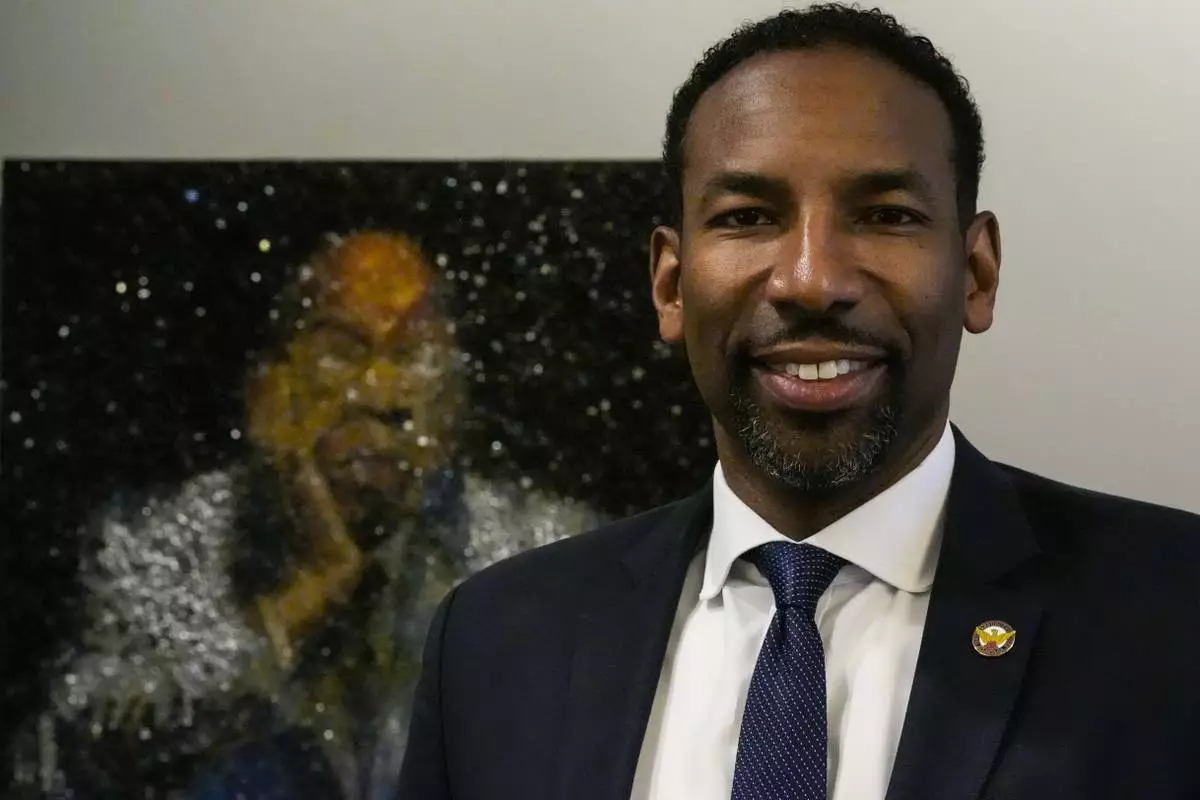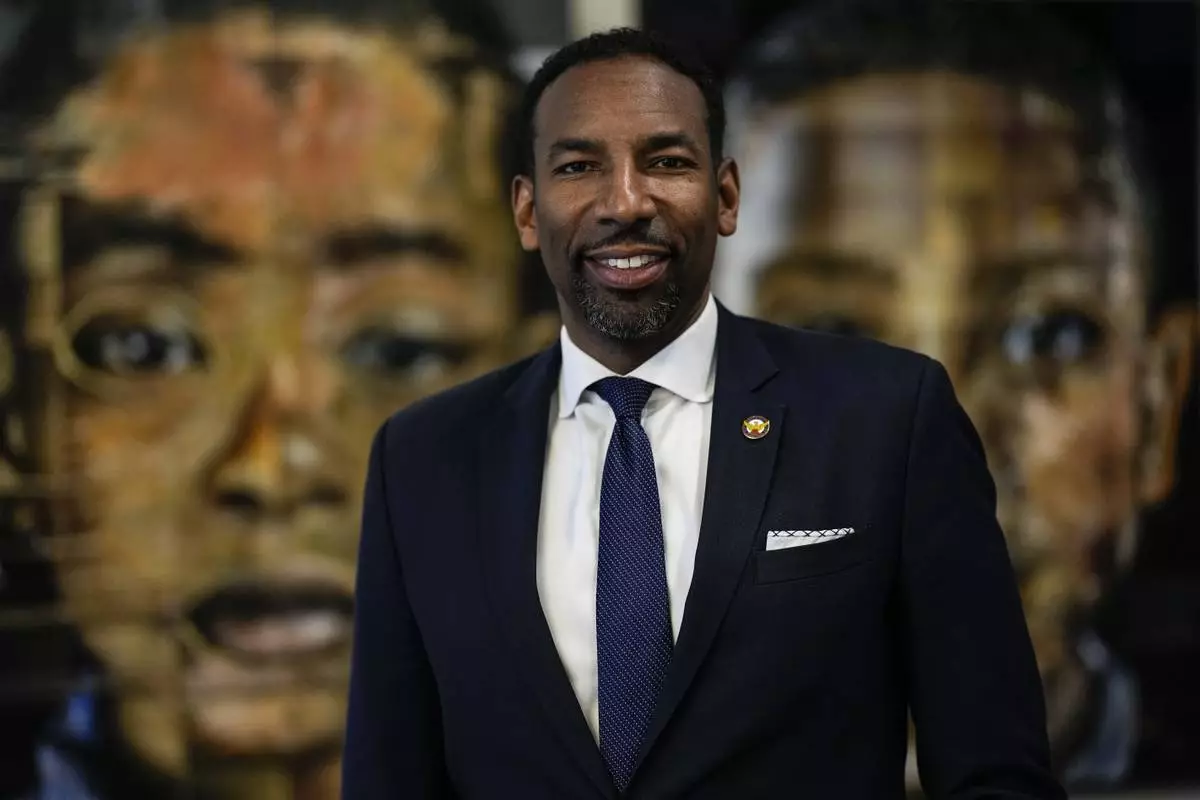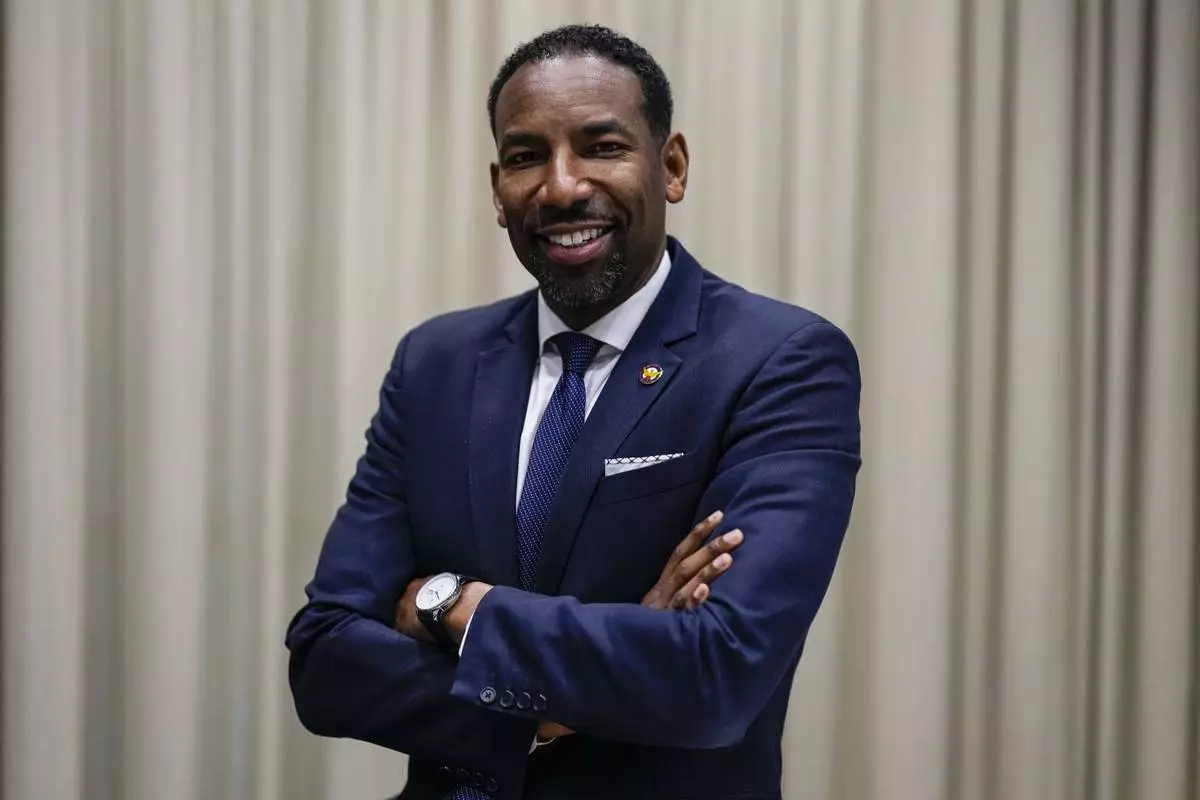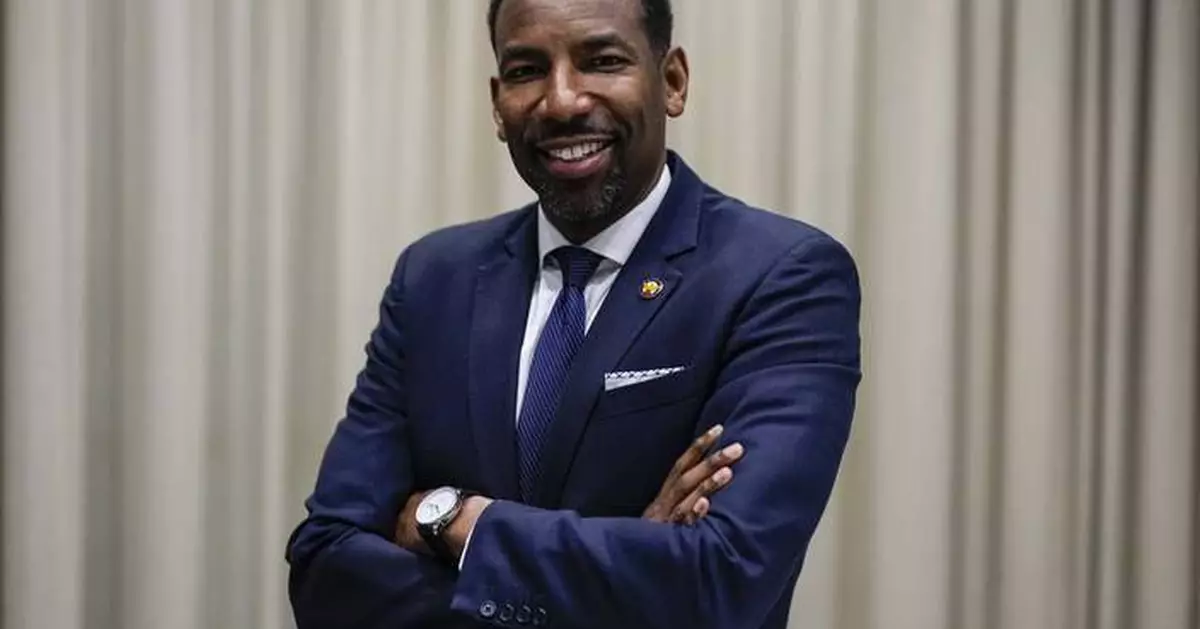ATLANTA (AP) — After leading Atlanta out of the COVID-19 pandemic and a coinciding crime spike, Mayor Andre Dickens believes he deserves a second term as the city soon hosts its most high-profile event since the 1996 Olympics.
Dickens recently launched his reelection campaign with $1.4 million in the bank and support from Atlanta’s business and political elite, including civil rights hero and former mayor Andrew Young and Jason Carter, Jimmy Carter’s grandson.
Atlanta’s next mayor will preside as visitors flood the city for eight matches of the 2026 World Cup. No prominent challengers have emerged for the fall election. If that holds through candidate qualifying in August, Dickens’ second mayoral bid could forgo the drama of 2021, when the then-city councilman won a surprise victory over two better-known rivals.
Dickens says he’s fulfilling promises to lower crime and boost affordable housing. And he shrugs off criticism from activists who say he’s alienated the city’s progressives — most notably for his support of a $115 million police and firefighter training center derided by opponents as “Cop City.”
“The city got stabilized during my term, unified during my term, and is on a path that everybody can want to come here to raise a family,” Dickens told The Associated Press in an interview.
Emory University law professor Fred Smith Jr. said Dickens has been an “energizing force,” adding he ramped up affordable housing construction and helped thwart efforts for Atlanta’s wealthiest neighborhood to break away from the city.
“In terms of where he has done less well, I think a lot of folks who pay close attention to Atlanta government don’t feel heard, especially on issues related to transit and the public training center,” Smith said.
Atlanta is one of 16 cities in the U.S., Canada and Mexico hosting the 2026 FIFA World Cup, with a preview this summer when it hosts six matches of the FIFA Club World Cup, another international soccer tournament.
The games will bring more traffic to the increasingly packed city. Like past mayors, Dickens has been slow to expand public transportation. He backed away from plans to build a light rail line along the city’s Eastside Beltline trail, saying shifting to other projects will help higher-need areas. Those are expected to take years to complete.
Regardless, Dickens insisted Atlanta will have a “very festive time” during the World Cup with repaved roads and upgraded lighting.
“I want people to leave knowing our culture, having supported our small businesses, having experienced Atlanta so that they might want to come back as a vacation or bring their business here, open an office here,” Dickens said.
Dickens promised to build or preserve 20,000 affordable housing units over two terms.
Over half have been built or are under construction. Most are rentals and around three-quarters are for people making 60% or less of the midpoint household income, which was $85,880, according to 2023 U.S. Census Bureau figures. Some are on government-owned land or part of neighborhood redevelopments with mixed-income housing.
Even as it builds, Atlanta is quickly losing affordable units as wealthier people move in and push poorer, longtime residents out, a pattern that was accelerated after the Olympics. Dickens acknowledges this obstacle.
Despite investing millions to reduce homelessness and quickly house people, Dickens’ administration was criticized in January when a man died after being crushed in his tent by a bulldozer clearing a homeless camp ahead of Martin Luther King Jr. holiday events.
Dickens called for rethinking how the city clears encampments, but said they are unsafe for people living there and nearby residents.
Another top priority for Dickens was reducing crime, which spiked in Atlanta and other U.S. cities during the pandemic and later fell. From 2023 to 2024, overall violent crime in Atlanta fell by 46%, and youth crime dropped by 23%, law enforcement officials said at a recent press conference with Dickens.
Atlanta Police Chief Darin Schierbaum credited Dickens with raising officers' pay and letting them take home patrol cars, saying the moves retained more officers and halved 911 response times. Dickens also launched sports and job programs for thousands of young people to take a “holistic” approach to crime.
Then there's “Cop City.”
Dickens has supported the training center since he was a council member, saying Atlanta would benefit from better-trained police. It opened fully on Tuesday.
The project became a flashpoint for progressive activists who argued it would further militarize police and damage the environment of an adjacent Black neighborhood. Tensions rose when a protester was killed by police who argued they had shot at them.
Efforts to “diminish and vilify” the training center's critics have created a “deep, deep, deep mistrust between people who could have been this mayor’s greatest allies” and Dickens' office, said Rohit Malhotra, founder of the Center for Civic Innovation, a progressive group that sought a voter referendum to reject the construction.
Last May, a burst pipe deprived many Atlantans of water for days, and Dickens was slammed for poor communication. He now says plans are underway to fix the city’s aging water and sewer system.
The city's inspector general resigned in February following a long-running feud with Dickens. She accused him of trying to thwart her oversight of City Hall. He said her methods broke the law.
Dickens said he hopes to mend relationships with his critics.
“The unifier in me is going to use the power of being a second-term mayor to bring everybody into the group project,” Dickens said.
Kramon is a corps member for The Associated Press/Report for America Statehouse News Initiative. Report for America is a nonprofit national service program that places journalists in local newsrooms to report on undercovered issues. Follow Kramon on X: @charlottekramon.

Atlanta Mayor Andre Dickens poses for a photo, Friday, Feb. 21, 2025, in Atlanta. (AP Photo/Mike Stewart)

Atlanta Mayor Andre Dickens poses for a photo, Friday, Feb. 21, 2025, in Atlanta. (AP Photo/Mike Stewart)

Atlanta Mayor Andre Dickens poses for a photo, Friday, Feb. 21, 2025, in Atlanta. (AP Photo/Mike Stewart)
The Golden Globes bill themselves as Hollywood’s booziest bash. This year, is anyone ready to party?
Political tension and industrywide uncertainty are the prevailing moods heading into Sunday night's 83rd Golden Globes. Hollywood is coming off a disappointing box-office year and now anxiously awaits the fate of one of its most storied studios, Warner Bros.
A celebratory mood might be even more elusive given that the wide majority of the performers and filmmakers congregating at the Beverly Hilton in Beverly Hills, California, oppose the policies of President Donald Trump. Likely to be on the minds of many attendees: the recent U.S. involvement in Venezuela and the fatal shooting of 37-year-old mother Renee Good in Minneapolis by Immigration and Customs Enforcement.
But through their ups and downs, the Globes have always tried to put pomp over politics. Host Nikki Glaser has vowed as much.
“You’d be surprised that half the room had no clue why I was saying ‘Venezuela,’” Glaser told The Associated Press earlier in the week, referring to her comedy-club warm-ups. “People aren’t getting the news like we all are.”
Glaser, a comic known for her roast appearances, has promised to go after A-listers in her second time hosting.
“We’re going to hit Leo,” Glaser said. “The icebergs are coming.”
Here’s what to look for at this year’s Globes:
The Golden Globes kick off at 8 p.m. EST on CBS while streaming live for Paramount+ premium subscribers. E!’s red carpet coverage begins at 6 p.m. EST.
The Associated Press will be have a livestream show beginning at 4:30 p.m. Eastern with a mix of stars' arrivals, fashion shots and celebrity interviews. It will be available on YouTube and APNews.
The overwhelming Oscar favorite “One Battle After Another” comes in with a leading nine nominations. It’s competing in the Globes’ musical or comedy category, which means the drama side might be more competitive. There, Ryan Coogler’s “Sinners,” Chloé Zhao’s “Hamnet” and Joachim Trier’s “Sentimental Value” are all in the mix.
But thus far, “One Battle After Another” has cleaned up just about everywhere. Much of Paul Thomas Anderson’s cast is nominated, including DiCaprio, Teyana Taylor, Sean Penn, Chase Infiniti and Benicio Del Toro.
If it and “Sinners” take home the two biggest prizes, it will be a banner night for Warner Bros. even as its future hangs in the balance. The studio has agreed to be acquired by Netflix is a deal worth $82.7 billion. Movie theaters have warned such a result would be “a direct and irreversible negative impact on movie theaters around the world.”
The merger awaits regulatory approval, while Paramount Skydance is still trying to convince Warner shareholders to accept its rival offer.
After an audacious promotional tour for “Marty Supreme,” Timothée Chalamet is poised to win his first Globe in five nominations. In best actor, comedy or musical, he’ll have to beat DiCaprio, a three-time Globe winner, and Ethan Hawke (“Blue Moon”).
In best actress, comedy or musical, Rose Byrne is the favorite for her performance in the not especially funny A24 indie “If I Had Legs I’d Kick You.” One prominent nominee in the category, Cynthia Erivo (“Wicked: For Good”), won’t be attending due to her schedule in the West End production “Dracula.”
Jessie Buckley (“Hamnet”) is the clear front-runner in best actress, drama. In the star-studded best actor, drama, category, the Brazilian actor Wagner Moura (“The Secret Agent”) may win over Michael B. Jordan (“Sinners”) and Joel Edgerton (“Train Dreams”).
In the supporting categories, Teyana Taylor and Stellan Skarsgård come in the favorites.
The Globes, formerly presented by the Hollywood Foreign Press Association, have no overlap or direct correlation with the Academy Awards. After being sold in 2023 to Todd Boehly’s Eldridge Industries and Dick Clark Productions, a part of Penske Media, the Globes are voted on by around 400 people. The Oscars are voted on by more than 10,500 professionals.
But in the fluctuating undulations of awards season, a good speech at the Globes can really boost an Oscar campaign. Last year, that seemed to be the case for Demi Moore, who won for “The Substance” and gave the night's most emotional speech. Mikey Madison (“Anora”), however, scored the upset win at the Oscars.
A few potentially good moments this year went instead in a Golden Eve ceremony earlier this week. There, the Cecil B. DeMille and Carol Burnett honorees, Helen Mirren and Sarah Jessica Parker, accepted their awards.
One to watch, if he wins, will be the Iranian director Jafar Panahi. His revenge drama “It Was Just an Accident” is up for four awards. Panahi has spent most of his career making films clandestinely, without approval of authorities, and was until recently banned from leaving the country. Last month, he was sentenced to a year in prison, which would be only his latest stint behind bars if Panahi returns home to serve it. This week, protests over Iran’s ailing economy have spread throughout the country in a new test to Iran's leaders.
For the first time, the Globes are trotting out a new podcast category. The nominees are: “Armchair Expert,” “Call Her Daddy,” “Good Hang With Amy Poehler,” “The Mel Robbins Podcast,” “SmartLess” and “Up First.”
In TV, HBO Max’s “The White Lotus” — another potential big winner for Warner Bros. — leads with six nominations. Netflix’s “Adolescence” comes in with five nods.
But the most closely watched nominee might be “The Studio.” The first season of Seth Rogen’s Hollywood satire memorably included an episode devoted to drama around a night at the Globes. (Sample line: “I remember when the red carpet of the Golden Globes actually stood for something.”) “The Studio” is up for three awards, giving three chances for life to imitate art.
For more coverage of this year’s Golden Globe Awards, visit: https://apnews.com/hub/golden-globe-awards

Amy Poehler, left, and Joel Lovell arrive at the 83rd Golden Globes on Sunday, Jan. 11, 2026, at the Beverly Hilton in Beverly Hills, Calif. (AP Photo/Chris Pizzello)

Owen Cooper arrives at the 83rd Golden Globes on Sunday, Jan. 11, 2026, at the Beverly Hilton in Beverly Hills, Calif. (AP Photo/Chris Pizzello)

Teyana Taylor arrives at the 83rd Golden Globes on Sunday, Jan. 11, 2026, at the Beverly Hilton in Beverly Hills, Calif. (Photo by Richard Shotwell/Invision/AP)

Teyana Taylor arrives at the 83rd Golden Globes on Sunday, Jan. 11, 2026, at the Beverly Hilton in Beverly Hills, Calif. (Photo by Richard Shotwell/Invision/AP)

Stellan Skarsgård, left, and Megan Everett-Skarsgard arrive at the 83rd Golden Globes on Sunday, Jan. 11, 2026, at the Beverly Hilton in Beverly Hills, Calif. (Photo by Jordan Strauss/Invision/AP)

Colman Domingo arrives at the 83rd Golden Globes on Sunday, Jan. 11, 2026, at the Beverly Hilton in Beverly Hills, Calif. (Photo by Jordan Strauss/Invision/AP)

Selena Gomez arrives at the 83rd Golden Globes on Sunday, Jan. 11, 2026, at the Beverly Hilton in Beverly Hills, Calif. (Photo by Jordan Strauss/Invision/AP)

Nikki Glaser arrives at the 83rd Golden Globes on Sunday, Jan. 11, 2026, at the Beverly Hilton in Beverly Hills, Calif. (Photo by Jordan Strauss/Invision/AP)

Maura Higgins, from ledt, Gayle King, and Mona Kosar Abdi arrive at the 83rd Golden Globes on Sunday, Jan. 11, 2026, at the Beverly Hilton in Beverly Hills, Calif. (Photo by Jordan Strauss/Invision/AP)

Derek Hough arrives at the 83rd Golden Globes on Sunday, Jan. 11, 2026, at the Beverly Hilton in Beverly Hills, Calif. (Photo by Jordan Strauss/Invision/AP)

Tessa Thompson arrives at the Golden Globes Golden Eve on Tuesday, Jan. 6, 2026, at The Beverly Hilton Hotel, in Beverly Hills, Calif. (Photo by Jordan Strauss/Invision/AP)

Nikki Glaser rolls out the red carpet during the 83rd Golden Globes press preview on Thursday, Jan. 8, 2026, at the Beverly Hilton in Beverly Hills, Calif. (AP Photo/Chris Pizzello)
























